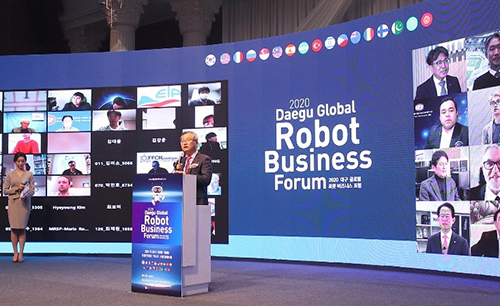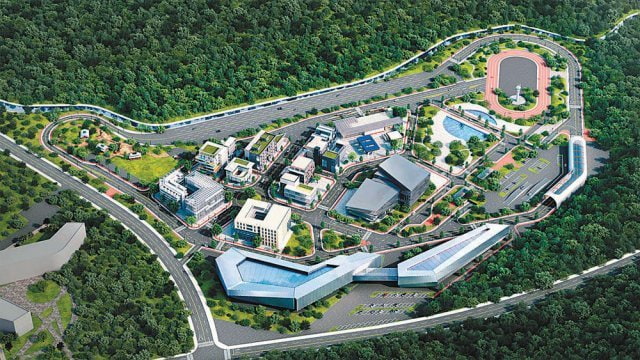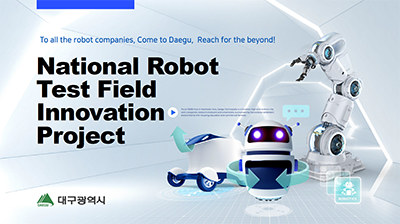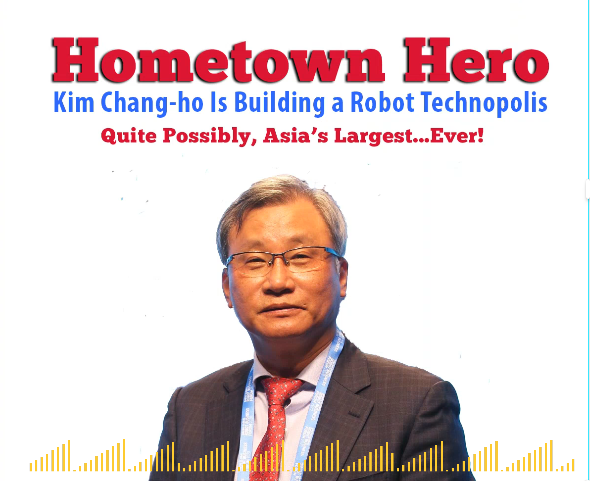
The Rise of Daegu City
Kim Chang-ho Leads Drive for Robot Technopolis
Decade of work pays off in high-tech victory as Daegu City wins nationwide competition as mega-site for Korea’s Robot Technopolis
Chairman Kim Chang-ho is a man of many hats: one as Chairman of the Global Robot Cluster (GRC), another as Chairman of the Robot Enterprise Promotion Association (REPA), three more as Founder, Director and CEO of AJINEXTEK Co., Ltd., and yet another, maybe the one he’s proudest of, as hometown hero successfully promoting Daegu City since 2010 into a robotics hub, and now, after an intense national competition, as the mega-site for Korea’s massive Robot Technopolis.
Global Robot Cluster November Meeting to Plan Roadmap of Next Steps 2022-2028
With the official announcement in August, Daegu City as Robotics Technopolis serves as a brilliant capstone to Chairman Kim’s ten years of persistent work building out the city’s robotics ecosystem.
With over 100 robotics companies, educational institutions and R&D facilities already resident in Daegu City, and with another 500 projected between 2022 and 2028, the Daegu Robot Technopolis, known officially as the National Robot Innovation Project, might well become the largest robot city in Asia.
The rise of Daegu as Robot Technopolis begins in earnest this November 17 with the annual board meeting and general assembly of the Global Robot Cluster (GRC), founded by Chairman Kim, and built out to now include twenty members from seventeen countries.
The GRC and its member delegations, together with Daegu’s Mayor Kwon Young-jin, who was instrumental in winning the nationwide competition, will convene to plan a roadmap of next steps for the city and its initial $257 million in government funding.
With the official announcement in August, Daegu City as Robotics Technopolis serves as a brilliant capstone to Chairman Kim’s ten years of persistent work building out the city’s robotics ecosystem.
With over 100 robotics companies, educational institutions and R&D facilities already resident in Daegu City, and with another 500 projected between 2022 and 2028, the Daegu Robot Technopolis, known officially as the National Robot Innovation Project, might well become the largest robot city in Asia.
The rise of Daegu as Robot Technopolis begins in earnest this November 17 with the annual board meeting and general assembly of the Global Robot Cluster (GRC), founded by Chairman Kim, and built out to now include twenty members from seventeen countries. The GRC and its member delegations, together with Daegu’s Mayor Kwon Young-jin, who was instrumental in winning the nationwide competition, will convene to plan a roadmap of next steps for the city and its initial $257 million in government funding.
Interview with Chairman Kim Chang-ho, Global Robot Cluster
Q: What was your motivation behind the founding of the Global Robot Cluster?
A: Whether at work or during leisure time, the robot has become an important part of our quality of living. The success of deploying robots in factories has made it possible for the man in the street to experience the benefits of using a robot.
Since many countries have robot unions and associations which tend to help locally, my vision was a simple one: to establish “a global federation of robotic clusters to support the development and business of robotics technology, especially here in Korea and Daegu City.

Q: Can you share some examples of the kinds of technical cooperation among the Global Robot Cluster members?
A: Every year, since 2017, the GRC has organized our annual Robot Business Forum in November. This is attended by over 500 representatives from more than 30 countries from around the world.

We discuss industry applied research, share innovations and provide a platform for intellectual exchange. Cluster representatives are invited to visit Daegu, Korea not only for the international meeting but also to enjoy and gain an appreciation for our city and its local culture. However, due to the CoVID-19 pandemic, our 2020 edition was held both online and offline.
In addition, the GRC launched a Quarterly Webinar series in 2021. The inaugural edition was spearheaded by the Singapore and Malaysian Clusters. Mr. Oliver Tian, Singapore Board Member and Dr. Ishkandar Baharin, Malaysian Board Member, who organized an insightful webinar on the global stage to discuss the theme of “Robotics Impact on Society” on 25 March 2021. This was followed by a 2nd webinar in June co-hosted by our US Clusters.

Q: Given the structure of the GRC network of robot clusters, how do you encourage your member clusters on project collaborations?
A: We have been working diligently and cooperatively over the past 9 months on a national project. This project allows us to bring together members of the robot cluster to collaborate and jointly deliver a mega scale project at the state level. I am proud to announce that we have won the contract to develop the National Robot Field Test Centre in Daegu City. This initiative is led by the Robot Enterprise Promotion Association (REPA) as well as strong commitments from 30 GRC member clusters to contribute to the project over the next 5 years.

Our project intention is to build Daegu as a “Leading Robot Industry City”, where humans and robots can co-exist in a cohesive environment. We hope to attract 662 robot-related companies and employ another 12,000 talents, contributing to 41 trillion KRW [$35 billion]. The project has three anticipated goals: (1) providing a Balanced Regional Development Platform, (2) nudging Industry Innovation, and (3) building a Hub-city of Future Industry.
Through both the individual and combined efforts of the Global Robot Cluster’s members, we will be able to attract promising robotics companies to come together to foster comparative competition, to secure high skills standards, and establish relevant comparative advantages to enhance workflow productivity.
We are confident there will be synergy among participating robotics companies (both local and regional) to increase the effectiveness of the robot industry. The National Robot Field Test Centre will serve as a platform to provide systematic proliferation of performance standards that will steer innovations toward realistic demonstrations of a human-centric “smart city”.
Q: Given this mega plan, what are your next steps?
A: We are organizing a planning session with Mr Kwon Young-jin, Mayor of Daegu City to roadmap the activities with our participating GRC member clusters. It will be a very exciting project, as I believe this will probably be a first of its kind in which the private sector, led by robotic clusters of the global regions, come together to draft and execute a plan for a common cause.
I am confident that my Global Robot Cluster members will actively contribute to this project and ultimately reap the benefits of global success.
We are absolutely positive that this platform will draw domestic and international major investment firms, and act as a foundation to give birth to unicorns. As domestic and international SMEs, investment partners, large enterprises, and global firms continuously take part in the platform, we will have created a Global Robot Cluster platform that will set up a framework for a global robot industry ecosystem.


